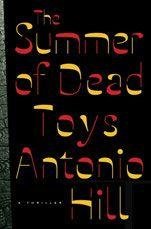Antonio Hill - The Good Suicides
Here you can read online Antonio Hill - The Good Suicides full text of the book (entire story) in english for free. Download pdf and epub, get meaning, cover and reviews about this ebook. genre: Detective and thriller. Description of the work, (preface) as well as reviews are available. Best literature library LitArk.com created for fans of good reading and offers a wide selection of genres:
Romance novel
Science fiction
Adventure
Detective
Science
History
Home and family
Prose
Art
Politics
Computer
Non-fiction
Religion
Business
Children
Humor
Choose a favorite category and find really read worthwhile books. Enjoy immersion in the world of imagination, feel the emotions of the characters or learn something new for yourself, make an fascinating discovery.
- Book:The Good Suicides
- Author:
- Genre:
- Rating:5 / 5
- Favourites:Add to favourites
- Your mark:
- 100
- 1
- 2
- 3
- 4
- 5
The Good Suicides: summary, description and annotation
We offer to read an annotation, description, summary or preface (depends on what the author of the book "The Good Suicides" wrote himself). If you haven't found the necessary information about the book — write in the comments, we will try to find it.
The Good Suicides — read online for free the complete book (whole text) full work
Below is the text of the book, divided by pages. System saving the place of the last page read, allows you to conveniently read the book "The Good Suicides" online for free, without having to search again every time where you left off. Put a bookmark, and you can go to the page where you finished reading at any time.
Font size:
Interval:
Bookmark:
Antonio Hill
The Good Suicides
Prologue
Lola Martnez Rueda, The Voice of the Others
Thursday, September 9, 2010
They were a lovely couple, say the neighbors. You didnt see him much, but he always seemed very well-mannered; hed be friendly and say hello. She kept her distance a little more, perhaps But she was certainly very devoted to her daughter. They had a beautiful baby, says the owner of a caf close to their home, situated in the Clot district of Barcelona, where a few days before, around ten oclock, Gaspar Rdenas, his wife Susana and their daughter, Alba, fourteen months, were having breakfast. They came many weekends, she adds. And without my asking she tells me what they usually had: a black coffee for him and white for her, and how beautiful the little one was. Minutiae, of course. Insignificant details and banal commentaries that now, in light of the facts, are disturbing.
Because in the early hours of September 5, while his wife slept, this meek but friendly father rose from the marital bed, entered the bedroom of his only child, put a pillow over her face and squeezed with all his might. We cannot know if the mother awoke, alerted perhaps by that sixth sense that has disturbed maternal sleep since time began. In any case, Gaspar Rdenas, such a well-mannered husband according to neighbors and colleagues, didnt intend to leave her alive either. Susana died shortly afterward, from a single shot to the heart. Then, as the canon of the chauvinist killer decrees, Gaspar gave himself the final shot.
The names of Susana and her daughter have swelled the list of women falling victim to those who in theory should have loved them, respected them and even, if we think of the little girl, protected them. Forty-four women have died in the course of this year (2010) at the hands of their partners. Forty-five, with the macabre addition of a daughter. Maybe this case does not conform to the formula we have learned to recognize: a separation under way, reports of ill-treatment. Gaspar Rdenas wasnt-such is the irony of life-a violent man.
The State can, for once, stick its neck out and declare that nothing seemed to indicate that Susana and Alba were in danger. And they are right But that just makes their deaths even more terrible, if possible. Because many of us women already know that mechanisms exist-however scarce and insufficient they may be-to defend ourselves against those men who believe they have a right to control our lives and our deaths. Against those guys who shout at us, put us down and beat us. What we cannot know is how to protect ourselves from the rancor that accumulates in silence, from that mute hatred which suddenly explodes one night and destroys everything.
There is a photo of the three taken just weeks before, on a beach in Menorca. In it Alba can be seen sitting on the shore with a red spade in her hand. She is wearing a little white cap to protect her from the August sun. Kneeling behind her is Susana. Happy, she smiles at the camera. And at her side, with his arm around her, is her husband. Seeing him there, in a relaxed pose, squinting in the sun, no one could have imagined that scarcely a month later this man would use those very hands that are caressing Susana to kill them both.
Why did this thirty-six-year-old man, with a steady, well-paid job in a well-known cosmetics company, with no extraordinary financial burdens and no previous record of any kind, commit murders even more repulsive than others? When did it occur to him to end the lives of his wife and daughter? At what moment did madness overcome him and distort daily reality to the extent of convincing him that death was the only way out?
The answer of his relatives, friends and work colleagues is still the same, although now none of them can believe what they insist on repeating: Gaspar, Susana and Alba were a normal family.
HECTOR
1
For the second time in a short period, Inspector Hctor Salgado turns his head suddenly, convinced someone is watching him, but he sees only anonymous and indifferent faces, people who, like him, are walking on a packed Gran Va and stop once in a while in front of one of the traditional stalls of toys and games occupying the pavement. It is January 5, the night before Reyes, though no one would think so judging by the pleasant temperature, ignored by some strollers conveniently dressed in overcoats, some even with gloves and scarf as befits the season, happy to participate in a sham of winter lacking the main ingredient: cold.
The parade has been finished for a while and the traffic fills the road under garlands of shining lights. People, cars, the smell of churros and hot oil, all seasoned with supposedly happy carols, their lyrics dipped in surrealism, which the loudspeakers launch against the passersby without the least decorum. It seems no one has bothered to compose new songs, so for yet another year there are the same fucking tidings of comfort of joy. That must be whats fucked up about Christmas, thinks Hctor: the fact that generally it always stays the same, while we change and grow older. It seems to him inconsiderate to the point of cruelty that this Christmassy atmosphere is the only thing that is repeated year after year without exception, making our decadence ever more evident. And for the umpteenth time in the last fifteen days he wishes hed flown from all the revelry to some Buddhist or radically atheist country. Next year, he repeats, as if it were a mantra. And to hell with what his son might say.
He is so absorbed in these thoughts that he doesnt notice that the queue of pedestrians, moving almost as slowly as that of the cars, has stopped. Hctor finds himself at a halt in front of a stall selling little plastic soldiers in bags: cowboys and Indians, Allied soldiers dressed in camouflage ready to shoot from a trench. He hasnt seen them in years and remembers buying them for Guillermo when he was a kid. In any case, the vendor, an old man with arthritic hands, has managed to re-create an exquisite military scene, down to the last detail, worthy of a 1950s film. Thats not all he sells: other soldiers, the traditional lead ones, bigger and in shiny red uniforms, march on one side, and a legion of Roman gladiators, historically out of place, on the other.
The old man gestures to him, inviting him to touch the goods, and Hctor obeys, more out of manners than any real interest. The soldier is softer than he expected and the feel of it, almost like human flesh, repulses him. Suddenly he realizes that the music has ceased. The passersby have halted. The car lights have been switched off and the Christmas lights, flickering weakly, are the streets only lighting. Hctor closes his eyes and opens them again. Around him the crowd begins to vanish; the bodies suddenly disappear, evaporate without leaving the least trace. Only the vendor remains at his stall. Wrinkled and smiling, he takes one of those snow globes out from under the counter.
For your wife, he says. And Hctor is about to answer that no, Ruth detests those glass domes; theyve upset her ever since she was a child, like clowns do. Then the flakes clouding the interior fall to the bottom and he sees himself, standing in front of a toy soldier stall, trapped within the glass walls.
Papa, Papa
Shit.
The television screen covered in gray snow. His sons voice. The pain in his neck from having fallen asleep in the worst possible position. The dream had been so real on Reyes night.
You were shouting.
Shit. When your own son wakes you out of a nightmare the moment has come to resign as a father, thought Hctor as he sat up on the sofa, sore and in bad humor.
I fell asleep here. And what are you doing awake at this time of night? he counterattacked.
Guillermo shrugged his shoulders without saying anything. As Ruth would have done. As Ruth had done so many times. In an automatic gesture, Hctor searched for a cigarette and lit it. Cigarette butts were spilling out of the ashtray.
Font size:
Interval:
Bookmark:
Similar books «The Good Suicides»
Look at similar books to The Good Suicides. We have selected literature similar in name and meaning in the hope of providing readers with more options to find new, interesting, not yet read works.
Discussion, reviews of the book The Good Suicides and just readers' own opinions. Leave your comments, write what you think about the work, its meaning or the main characters. Specify what exactly you liked and what you didn't like, and why you think so.









